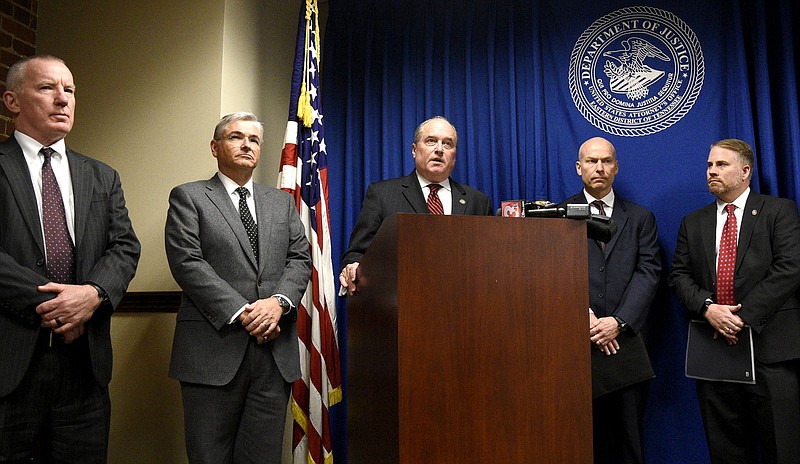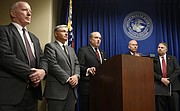Now that they've pleaded guilty in federal court to wire fraud and money laundering, the men who failed to bring a promised textile mill to Bledsoe County can expect to face a fresh set of charges, said Mike Taylor, district attorney for Tennessee's 12th Judicial District.
"I definitely intend to pursue state charges," Taylor said. "It's not over for me."
Twin brothers Karim and Rahim Sadruddin, both 33, executed a complex series of financial frauds worth more than $30 million against federal, state and regional agencies. They each pleaded guilty in federal court Wednesday in Chattanooga to two counts of wire fraud and one count of money laundering.
The men face maximum penalties of 30 years in prison and a $1 million fine for wire fraud, and 10 years in prison and fines equal to twice the value of the property they gained through criminal means for money laundering. Their sentencing is scheduled for March 2020.
The financial crimes that began in the spring of 2017 were connected to a range of schemes, from the unfulfilled promise of the new textile plant they said would bring 1,000 jobs to economically depressed Bledsoe County to substandard tarps delivered to hurricane victims in Puerto Rico through a FEMA contract worth more than $30 million.
Partial timeline
April 2017: Karim and Rahim Sadruddin meet with officials from state and federal entities, promising to invest $27 million in a new textile plant in Pikeville, Tennessee.July 2017: The Tennessee Department of Economic and Community Development approves a $3 million grant to the Sadruddins’ Textile Corporation of America for the purchase and renovation of a building for the plant.September-October 2017: Hurricanes Irma and Maria strike Puerto Rico.September 2017: The Sadruddins’ Master Group USA submits a bid to FEMA to provide tarps for hurricane relief, which they amend in November to meet the requirement that the tarps not be manufactured in China.October 2017: Karim Sadruddin emails the Southeast Tennessee Development District a fraudulent wire transfer record and invoice reflecting work done on the building in Pikeville.November 2017: FEMA awards the Sadruddins a $30.7 million contract to provide tarps for hurricane relief.November 2017: The Bledsoe County Industrial Development Board sends $2.3 million to the Sadruddins; they use a portion of the money to buy Chinese-made tarps to fulfill the FEMA contract.November 2017-January 2018: The Sadruddins deliver 58,000 tarps and collected $3.7 million before FEMA issues a stop work order.May 2018: Rahim Sadruddin emails TVA and falsely reports that the textile plant is operating.July 2018: TVA sends the Sadruddins a $230,000 performance grant for the Pikeville textile plant.
"It's easy to lose sight of the fact that there are actual real victims beyond the government," said Assistant U.S. Attorney Steve Neff, who led the multi-agency investigation of the Sadruddins. "There are also 1,000 people in Bledsoe County who thought, 'I might be able to get one of those jobs,' and there are families in Puerto Rico who didn't get the supplies they desperately needed. There are a lot of people affected by this."
The coordination of regional, state and federal entities was critical to untangling the case, Neff said. When the FEMA fraud first came to light, the connection to Tennessee wasn't clear. By chasing the money, investigators uncovered the connection, he said.
The Tennessee Comptroller's Office of the Treasury played a significant role in revealing and weaving together the pieces of the case, along with the Tennessee Bureau of Investigation and the district attorney's office, Neff said.
"The folks that work on these cases do a lot of hard work, and most of the time people don't get to see it," he said.
Taylor said his next move will be either to bring charges against the Sadruddins to the grand jury that will convene on Nov. 25, or to work with attorneys for the brothers on a plea agreement.
"This was all state money," Taylor said. "There was a lot of complexity to it, that's for sure, but the reason the Tennessee Comptroller was involved is because it was state money."
Contact Mary Fortune at mfortune@timesfreepress.com or 423-757-6653. Follow her on Twitter at @maryfortune.

